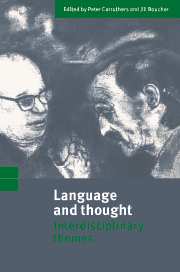Book contents
- Frontmatter
- Contents
- List of contributors
- Preface
- 1 Introduction: opening up options
- Part I Language, development and evolution
- Introduction to part I
- 2 Thought before language: the expression of motion events prior to the impact of a conventional language model
- 3 The prerequisites for language acquisition: evidence from cases of anomalous language development
- 4 Some thoughts about the evolution of LADS, with special reference to TOM and SAM
- 5 Thinking in language? Evolution and a modularist possibility
- Part II Language, reasoning and concepts
- Part III Language and conscious reasoning
- References
- Author index
- Subject index
2 - Thought before language: the expression of motion events prior to the impact of a conventional language model
Published online by Cambridge University Press: 08 January 2010
- Frontmatter
- Contents
- List of contributors
- Preface
- 1 Introduction: opening up options
- Part I Language, development and evolution
- Introduction to part I
- 2 Thought before language: the expression of motion events prior to the impact of a conventional language model
- 3 The prerequisites for language acquisition: evidence from cases of anomalous language development
- 4 Some thoughts about the evolution of LADS, with special reference to TOM and SAM
- 5 Thinking in language? Evolution and a modularist possibility
- Part II Language, reasoning and concepts
- Part III Language and conscious reasoning
- References
- Author index
- Subject index
Summary
Language and thought over developmental time
Languages across the globe vary in how they classify experience. Do such variations in classification affect the way speakers consider their worlds, even when they are not speaking? Benjamin Lee Whorf (1956) first popularised the notion that linguistic classifications might influence, not only how one talks about the world, but also how one thinks about the world when not actually speaking. In other words, one might partition the world differently depending upon the language one speaks. This hypothesis remains intriguing, although it has proved surprisingly difficult to test (cf. Lucy, 1992a).
A particularly compelling example of the type of influence Whorf suggested was reported by Lucy (1992b), who explored the impact on thought of formal linguistic devices for marking number. Lucy began by analysing the distribution of these linguistic devices in two languages – Yucatec Mayan and American English – showing that different devices are used to mark different types of objects in both languages. For example, in both Yucatec and English, words for animals are marked by the plural (e.g., ‘two pigs’), while words for substances are not (e.g., one doesn't say ‘two muds’ in English unless referring to various types of mud). The two languages differ, however, in how they treat a third type of object – implements. In English, implements are marked by the plural, as are animals (e.g., ‘two rakes’, comparable to ‘two pigs’); in Yucatec, they are marked like substances. Thus, on linguistic grounds, implements are classified with animals in English but with substances in Yucatec.
Information
- Type
- Chapter
- Information
- Language and ThoughtInterdisciplinary Themes, pp. 26 - 54Publisher: Cambridge University PressPrint publication year: 1998
Accessibility standard: Unknown
- 21
- Cited by
